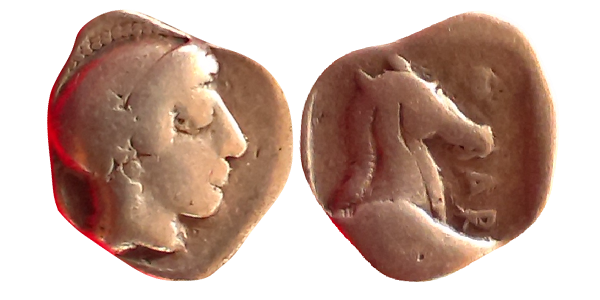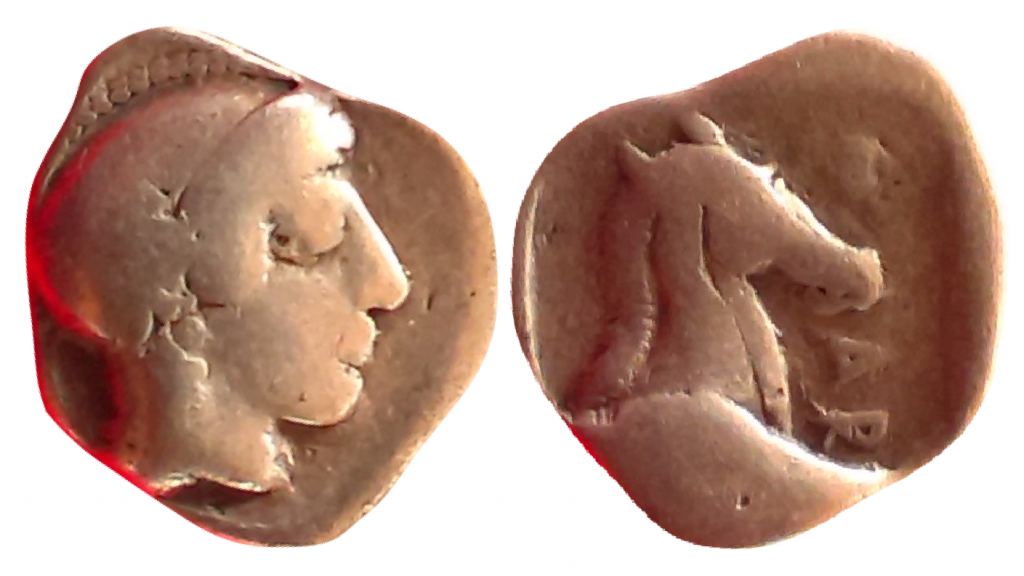
August 9, 2015, by Will Leveritt
On this day in 48 BC was the Battle of Pharsalus
Text by Mike Welbourn
Image © Mint Imperials
On this day in 48 BC, the Battle of Pharsalus was fought between the forces of Julius Caesar – who only nineteen months earlier had marched on Rome and installed himself as master of the city – and the Republican armies under Pompey the Great.

AR hemidrachm of Pharsalos, c. 425 BC. Obverse has helmeted head of Athena r. Reverse has horse’s head r., FAR reading downwards. 2.95g, 16mm, 12 o’clock.
Caesar and Pompey, alongside Marcus Crassus, had been close political allies during the late 60s to the late 50s. Pompey had even wed Caesar’s daughter Julia and was said to be genuinely in love with her. However, events would pull this alliance apart and see Pompey join the group of conservative optimate politicians who hated Caesar and sought to end his career by prosecuting him for his actions as both consul in 59 and as governor of the Gallic provinces from 58 onwards (for more on this see our posts of 13 July commemorating Caesar’s birthday).
Caesar knew what his enemies were aiming at and so, after some attempt at diplomacy which was rejected by the senate and Pompey, he chose to defend his own interests militarily: he would march on Rome. Pompey professed not to be worried by this turn of events. He confidently asserted that the veterans who fought under him in his various campaigns would rally to the cause of the Republic.
Unfortunately for Pompey, after crossing the Rubicon with only a single legion, Caesar’s march south to Rome was both surprisingly swift and made clear to his enemies how many of the towns and cities of Italy were prepared to side with him. Moreover, Pompey’s vast veteran army failed to materialize.
The speed and success of Caesar’s approach persuaded Pompey to take what troops he had (along with a majority of the senators) and flee Italy. He crossed to the eastern Mediterranean with his forces, leaving Italy via the port town of Brundisium (modern day Brindisi). Caesar, for his part, knew he could not leave the forces of his enemies unchallenged, and he soon set out for Spain where he defeated some of Pompey’s generals.
With his western flank secured, Caesar went after Pompey himself. He found him in Illyria and the two sides came to blows at the Battle of Dyrrhachium (in modern day Albania) in July 48. This initial encounter was almost a disaster for Caesar and he was obliged to retreat. He rested and refit his army at Gomphi before moving to the Greek town of Pharsalus where the climactic battle would be fought.
Pompey caught up with Caesar’s under-supplied and numerically inferior forces outside the town. In addition to having many more troops and supplies, Pompey occupied the high ground of the battlefield. Both generals organized their forces into three lines, but Caesar’s were thinner in terms of manpower. Both commanders also had the river Enipeus protecting their left flanks, which resulted in their respective cavalry forces being deployed on the right. It was the cavalry engagement that seems to have turned the battle.
Caesar in a daring tactical move, took troops from his three already undermanned lines and used them to form a fourth line that was tasked with supporting his cavalry. Caesar’s soldiers marched towards the enemy and when the infantries engaged Caesar’s came of worse. Pompey’s cavalry commander, Labienus, then moved in and repulsed Caesar’s mounted troops. It was at this point, when Caesar’s cavalry was starting to buckle that he used his fourth line of infantry to attack Labienus’ forces and rout them. With his cavalry now in disarray, and with Caesar throwing in what was left of his reserves, Pompey could see the battle had been lost and fled.
Caesar’s clever tactics had secured a somewhat surprising victory for him. In the aftermath of the battle, Pompey would run to Egypt where he was murdered by the boy-pharaoh Ptolemy XIII, who assumed Caesar would then support him in his own fight against his older sister, the famous Cleopatra. In the event, Caesar sided with the latter.
Thus, although in the next few years Caesar would be obliged to deal with a number of threats from other enemies, his key rival, Pompey the Great had effectively been dealt with at Pharsalus on 9 August 48.
No comments yet, fill out a comment to be the first

Leave a Reply